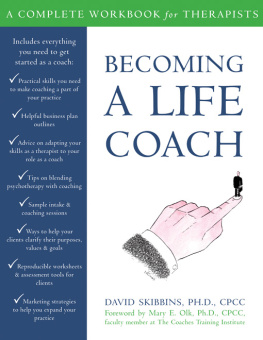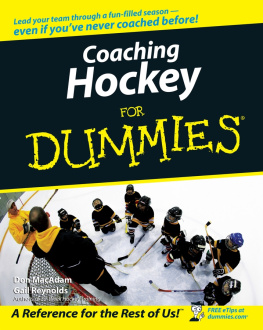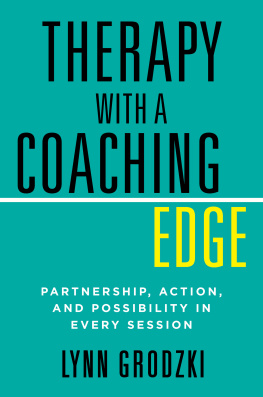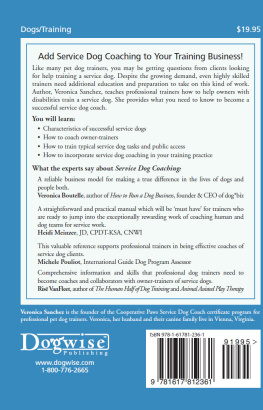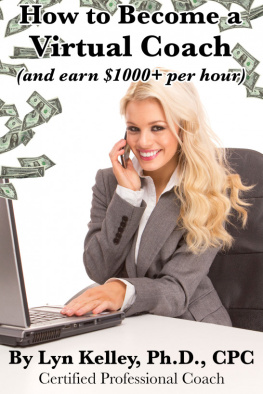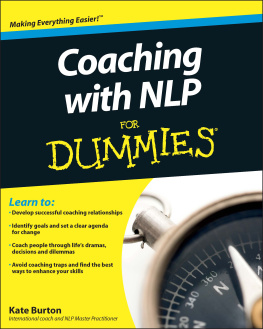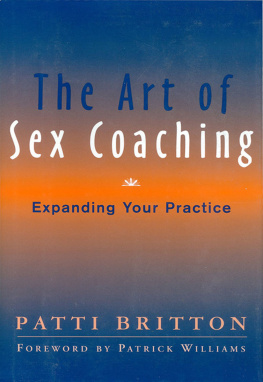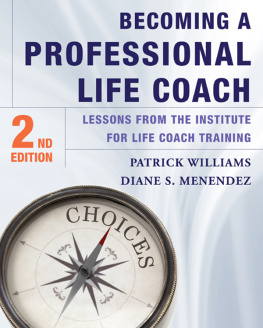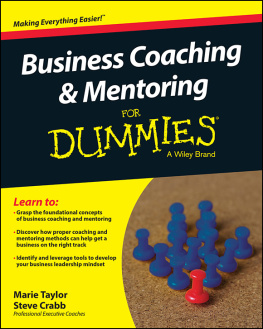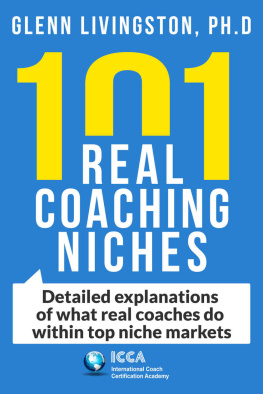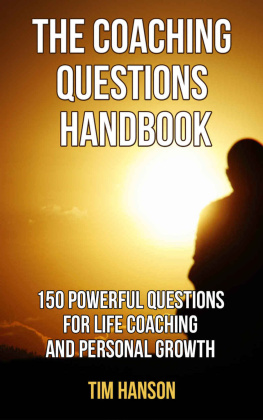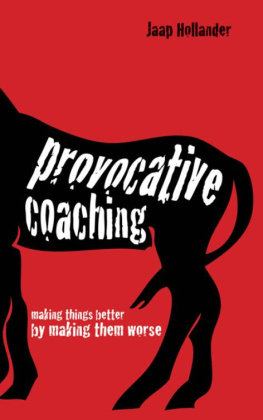Acknowledgments
My personal editor, Laura Kennedy, is a genius. Were it not for her patient guidance, my near-illiteracy would be apparent to the world. The proofreaders and editors at New Harbinger Publications have stewarded this book to the polished form it is today. A special thanks goes to Tesilya Hanauer at New Harbinger, who came up with the idea for this book and asked me to cocreate it with her.
The founders of the Coaches Training Institute also deserve special mention: Laura Whitworth, Henry Kimsey-House, and Karen Kimsey-House developed the core ideas of coactive coaching and created this preeminent worldwide coaching training facility. They are brilliant.
Finally, I acknowledge my partners at MyFullPractice.com: Meade Dickerson was instrumental in creating Success Coach 100, and my wife, Marla Skibbins, is my greatest support. Without her unconditional love and aliveness I would never have discovered this amazing profession. She is, always, my greatest inspiration.
David Skibbins, Ph.D., CPCC, is a licensed psychotherapist and practicing life coach. He lives on the Northern California coast with his brilliant wife and his frisky Portuguese Water Dog. David Skibbins first mystery, Eight of Swords, won the St. Martins Best Traditional Mystery Contest. www.davidskibbins.com
Foreword writer Mary E. Olk, Ph.D., CPCC, is a certified professional co-active coach with the Coaches Training Institute.
Chapter One
Embarking on the Journey
Twenty percent of therapists have either already added coaching to their repertoire, or are contemplating doing so. Since youve picked up this book, youre probably considering joining this group. Congratulations! Coaching is one of the most exciting adventures in the human services realm.
But what exactly is coaching? Many therapists wonder, How is coaching different from what I already do? Others comment, I havent the slightest idea how I would even begin to start a coaching practice.
This workbook arose in response to these laments. By the time youve finished reading the chapters and doing the exercises of this book, you will have already launched your career as a coach.
In the next chapter a lot of coaching skills will be introduced. But lets introduce the first coaching skill early, in the service of you moving toward success as a coach:
Coaching Skill: Envisioning a Future Outcome
Goal: When a client begins to vividly describe a possible future, he also begins to orient his actions toward it. A fleshed-out vision will pull a client toward it. The client will begin to see paths around obstacles, keeping his eyes on the prize rather than focusing on difficulties that lie in the way.
Tool: Take the client into a successful future; then ask questions to help the client powerfully visualize this intended future scenario.
Apply this tool to yourself: close your eyes for a moment and imagine youre on your way to becoming a highly successful coach as well as a psychotherapist. Seriously, close those eyes, even if just for a second. See and feel your experience. Congratulations! Now read on
Lets jump ahead to a couple of months in the future. Thanks to your hard work youve now successfully embarked on your coaching career. Lets see what you have accomplished in these first few months:
Ten Things You Have Learned from This Book
- You can now speak clearly about the differences between coaching and therapy.
- You can differentiate between clients who can benefit from coaching and clients who may need psychotherapy.
- Youre clear about what kind of person youre looking for as a potential coaching client.
- You know how to apply the strengths and tools you already have as a therapist to your coaching practice.
- You have learned new coaching tools and applied them to your work.
- You have learned how to self-coach to achieve the goals you desire in life.
- You know how to avoid the possible ethical, professional, and legal pitfalls and complications that could arise from blending a coaching practice with a psychotherapy practice.
- Youve created a business plan for your coaching practice tailored to your specific circumstances, with clear guidelines on how to succeed.
- Youve begun a marketing campaign to attract potential coaching clients.
- Youre promoting your coaching practice in a way that capitalizes on your strengths, and avoids forcing you to do things you dont want to do.
Nice job on your accomplishments! Not a bad list Now here is an exercise to help set you on this path:
Beginning with the Goal in Sight
- In a couple of sentences, describe the ideal career outcome youll achieve from reading this book.
- Describe what changes will occur in you to make you an excellent and successful coach.
- Imagine yourself two months into the future; what do you have now that you didnt have when you started reading this book?
Now lets start taking the steps necessary to get you from where you are to success as a coach. Well start with answering that perplexing question: What the heck is coaching anyway?
Chapter Ten
Legal, Administrative, & Ethical Issues
In this chapter well look at a collection of issues that arise when you add coaching to your current practice. First of all, lets consider the legal issuesand avoid lawsuits!
Legal Issues
As far as I know, coaching as a profession hasso farbeen relatively untouched by extensive lawsuits. Since large insurance companies arent involved in coaching there are no deep pockets for plaintiffs and their lawyers to pursue.
However, there are a variety of different legal issues that can arise with coaching; these include the dangers of a blended practice, coaching contracts, confidentiality, mandates to report, and the boundary between therapy and coaching.
The Dangers of a Blended Practice
Let me begin by uttering a ritual phrase that you will use often as a coachone that I am using right now as author of this book: I have no professional expertise in this area [law, in this case] and my opinions are those of a member of the general public. I recommend you consult a professional in this area [e.g., a lawyer] to get a professional opinion about these matters.
Good, with that out of the way, I can now talk about the problems of mixing coaching and therapy. I could make this section very short and just say, Dont do it. But it seems useful to explain why.
On the surface it seems an appealing idea. As therapists, we know that the distinctions between therapy and coaching set down in the early chapters arent entirely reflective of actual experience. The world cant really be neatly divided into two separate categories of people: those who are mentally ill and need therapy and those who are mentally healthy but could benefit from coaching. Some therapy clients actually have greater mental health than their therapists. Some very neurotic folks benefit greatly from coaching. Some folks oscillate between mental health and mental illness; everyone does the occasional tour through the dark side of their psyche.
A therapist who has stewarded a client through hard times seems the perfect person to also see this client into the land of fulfillment, satisfaction, and success. The trust between the two would be solidand the context the therapist-coach would bring to the work rich. The combination may work well for all concerned. But what happens if it doesnt?
Numerous books, articles, and legal opinions focus on the potential harmful effects to the client from these dual relationships. That isnt my concern in this sectionIm concerned about the harmful effects of these dual relationships on the therapist-coach. And, in my unprofessional legal opinion, these effects can be severe.

